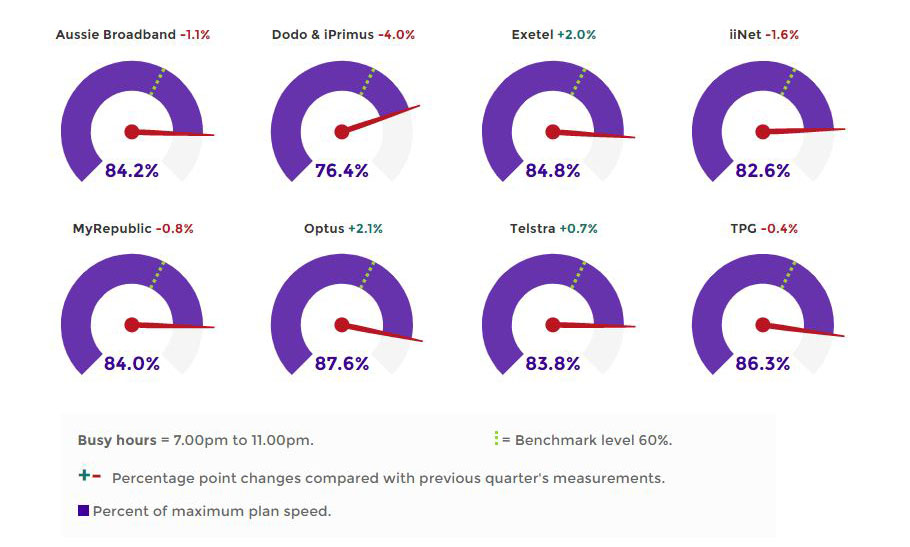Optus has ended TPG’s download speed dominance, unexpectedly claiming the number-one spot in the latest Australian Competition and Consumer Commission (ACCC) report on NBN performance.
The ACCC has today released its seventh Measuring Broadband Australia report, which compiles the average peak-hour NBN download speeds of eight major Australian broadband providers. Comprised of the results of more than 263,000 download speed tests conducted during August 2019, the ACCC rankings are determined by measuring the average speed attained during peak usage hours of between 7pm and 11pm.
Findings are expressed as a percentage of each connection’s maximum plan speed. The closer to maximum speeds a plan achieves, the higher its percentage score, with each provider’s average speed percentage determining the overall ACCC ranking. While the report isn’t the final say on which provider offers the fastest NBN plan, it does provide an insight into what customers can expect from their NBN service.
Fastest download speeds
In a major upset, Optus has dethroned long-term champion TPG, taking out top spot and booting TPG into second place. Optus has achieved an average peak hour result of 87.6% of its maximum plan speed, beating its previous May performance by almost two percentage points and edging out TPG’s result of 86.3%.

It’s a great improvement for Optus, especially as TPG has achieved a first-place rank for peak hour download NBN speeds in the past three ACCC reports. Speaking on behalf of the company, Optus Networks Managing Director Dennis Wong was understandably happy with the results.
“We are thrilled that Optus has the fastest NBN peak evening speeds independently tested by the ACCC.” said Mr. Wong. “The results reflect the considerable investment we’ve made to our network to improve our customers’ experience and ensure they consistently achieve a high level of performance.”
Overall, Optus, Telstra, and Exetel showed improved average speeds when compared to last quarter, while Aussie Broadband, Dodo/iPrimus, iiNet, MyRepublic, and TPG saw speeds slightly decline.
The full results are:
- Optus: 87.6%
- TPG: 86.3%
- Aussie Broadband: 84.2%
- MyRepublic: 84.0%
- Exetel: 84.8%
- Telstra: 83.8%
- iiNet: 82.6%
- Dodo & iPrimus: 76.4%
If you’re interested in plans from the above providers, we’ve listed several below. The following table shows a selection of published unlimited Standard Plus Evening Speed (NBN 50) plans on Canstar Blue’s database, listed in order of cost, from the lowest to highest and then by data allowance, largest to smallest. Use our comparison tool to see plans from a range of other providers. This is a selection of products with links to a referral partner.
Fastest upload speeds
Despite dropping in this quarter’s download speed rankings, TPG achieved a first-place result for average peak hour upload speeds. The telco hit an average of 87.8% of maximum upload speeds, just beating previous winner Exetel’s score of 87.5%.
The full results are:
- TPG: 87.8%
- Exetel: 87.5%
- Optus: 86.2%
- iiNet: 86.0%
- Aussie Broadband: 85.8%
- MyRepublic: 82.8%
- Telstra: 82.7%
- Dodo & iPrimus: 80.5%
ACCC: NBN speeds vary, so shop around
One of the biggest takeaways in the ACCC report is just how much NBN speeds can vary between telcos, with the gap between highest and lowest-performing providers increasing. While all included providers achieved average peak hour speeds of at least 75% of their plan maximum, customers should consider a telco’s real-world performance before jumping on board.
Fortunately, the number of under-performing services has declined, dropping from 12.4% in May to 11.4% in August. Under-performing services include connections which are unable to achieve at least 75% of their maximum plan speed, even outside of busy hours. Only 5.9% of tests from all providers failed to achieve at least 50% of their maximum speed, while 65.2% of tests achieved at least 90%.
One provider with noticeably lower percentage scores is Dodo/iPrimus, with the telco again ranking in last place for average download speeds. However, the ACCC has pointed out that, as Dodo and iPrimus promote speeds based on averaged evening data – rather than peak hour speeds exclusively – speeds experienced by customers in busy periods are much more likely to be slower than advertised.
If Dodo and iPrimus continue to list overall average speeds in plan advertising, customers may be disappointed during peak usage periods. The ACCC has stated it will follow up on this issue with Dodo and iPrimus, with Commission Chair Rod Sims emphasising that customers should be able to trust their provider’s advertised speed claims.
“If consumers are not getting what was promised by providers, they should contact them to ask about getting the problem fixed or moving onto a cheaper plan where the speeds are attainable.” said Mr Sims.
Improving your NBN speed
There are a number of factors that may influence your NBN speeds, regardless of your choice of provider. While telcos should continue to work on delivering fast-as-possible speeds across all NBN speed tiers, there’s several DIY options customers can try out in order to maximise their broadband performance, including upgrading equipment, or switching from wireless to a fixed connection.
You’ll also want to consider if you’re on the right NBN speed tier for your home’s daily needs. If you’re looking for fast, reliable speeds during peak hours, or you need a plan that can support multiple simultaneous users, you may want to upgrade to NBN 50 (Standard Plus Evening Speed) or higher, rather than sticking it out on a slower NBN speed.


Share this article